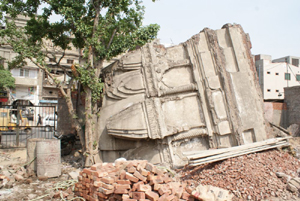Historic Jain temple demolished in Lahore
www.mangaloretoday.com
Lahore, Feb 12, 2016: Notwithstanding a court order, authorities in Pakistan’s Punjab province have demolished the remains of a centuries-old Jain temple to pave the way for a controversial metro line project here. In violation of the Lahore High Court’s order to suspend all work on the line within 200 feet of buildings of historical value, the Punjab government yesterday demolished the remains of the already damaged temple.
In violation of the Lahore High Court’s order to suspend all work on the line within 200 feet of buildings of historical value, the Punjab government yesterday demolished the remains of the already damaged temple.
Located near famous Anarkali Bazaar of old city, mob had damaged Jain Mandir in 1992 after the demolition of Babari Mosque in India.
The temple was being used these days for some commercial purposes like shops and the office of the Lahore Waste Management Company (LWMC) and a private filling station before its was completely destroyed yesterday by the Shahbaz Sharif government.
Supreme Court Lahore’s registry branch, Shalimar Garden, Chauburji monument, Saint Andrew Church, GPO building, tomb of Mehrunisa, Budhu ka Awa, tomb of Baba Mauj Daria, Shah Cheragh Building, Awan-e- Auqafand and Dai Anga Tomb are other historical sites that fall on the route of the project.
The Lahore High Court in January had issued a stay order against the construction work for the metro line project within 200 feet of historical buildings along its route.
Opposition parties in Punjab Assembly have not only brought a resolution in the House against the government’s move to demolish/damage historical sites but also launched a drive to protest against the Sharif brothers (Shahbaz and Prime Minister Nawaz Sharif), terming them as "builders having no care for the historical sites and people’s properties".
Activist Kamal Mumtaz rushed to the Lahore High Court and moved a contempt petition against the government for violating its court order and continuing the construction work of metro line. He pleaded to the court to intervene and stop the government from demolition of historical sites.
The Human Rights Commission of Pakistan called upon the Punjab government to review the project and desist from attacking the people’s basic rights to preservation of their heritage.
- JEE (Main) second edition results to be announced by April 19: NTA
- Three arrested for raping woman in Mangaluru, say police
- Summer rush: Special trains, Vande Bharat sleeper announced for Mangaluru
- Mangaluru: Yellow alert issued as thunderstorms expected across coastal Karnataka
- Mangaluru: Bride-to-be goes missing a day before wedding in Bolar
- Puttur: Grand Brahmarathotsav at Shri Mahalingeshwara Temple draws thousands with devotion and splendor
- Karnataka HC raps state over protest against Waqf Act amid pending SC case
- Fisheries Ministry to launch data collection across the country for Marine Fishers Census from November
- Elephant tries to sneak into house in Mudigere
- Holy Thursday celebrated with solemnity at Our Lady of Miracles Church, Milagres
- ABVP to launch ‘Save Mangalore University’ campaign
- MLA asks corporation to focus on landslip-prone areas and under-construction buildings ahead of Monsoon
- Mangaluru: Woman gang-raped near Netravati river, auto driver among three arrested
- CET row: Karnataka govt orders probe after students asked to remove sacred thread
- Man who flashed woman, assaulted 7 people arrested in Bengaluru
- FIR against Sunny Deol, Randeep Hooda for offending Christian religious sentiments in Jaat
- 22 maoists surrender before security forces in Chhattisgarh’s Sukma
- Indian Embassy repatriates 4 nationals scammed in Myanmar’s Myawaddy
- ED debunks Bengaluru man’s claims of importing Rs 50-crore wolfdog
- Special cabinet meeting on caste census in Karnataka ends without any major decision
- High Court to hear Ranya Rao bail plea on April 21
- India slams Pakistan Army chief’s remarks: ‘Kashmir’s only relation with Pak is…’
- Removal of sacred thread at CET centre in Shivamogga triggers row
- JD Vance, wife Usha to visit India from April 21-24, hold talks with PM Modi
- 22 Naxalites arrested, explosives seized in Chhattisgarh
- Skills and Competencies Take Center Stage at MSN Dialogue Series
- Court remands Maoist Lakshmi to six-day police custody
- Sandhya Shenoy honored with Society for Materials Chemistry Medal-2024
- White Cornus Apartment in Mangaluru
- City girl wins first place in state-level spell bee competition
- Alleged ‘Love Jihad’ Case in Mangaluru: Woman left home voluntarily, says police
- Girl fatally struck by reckless two-wheeler near Belman
- New residential complex for the judges inaugurated in Mangaluru
- Absconding accused nabbed after 8 years
- Truck with cylinders turns turtle in Beltangady
- Bhoota Kola artist dies of cardiac arrest
- Development of the country should be our goal: Ganesh Karnik
- Container truck gets stuck under Modankap railway bridge
- Truck crushes bike’s pillion rider near BC Road
- Head constable dies of heart attack
- CITY INFORMATION
- TRAVEL
- TOURIST INFORMATION
- HEALTH CARE
- MISCELLANEOUS




 Write Comment
Write Comment E-Mail To a Friend
E-Mail To a Friend Facebook
Facebook Twitter
Twitter  Print
Print 


